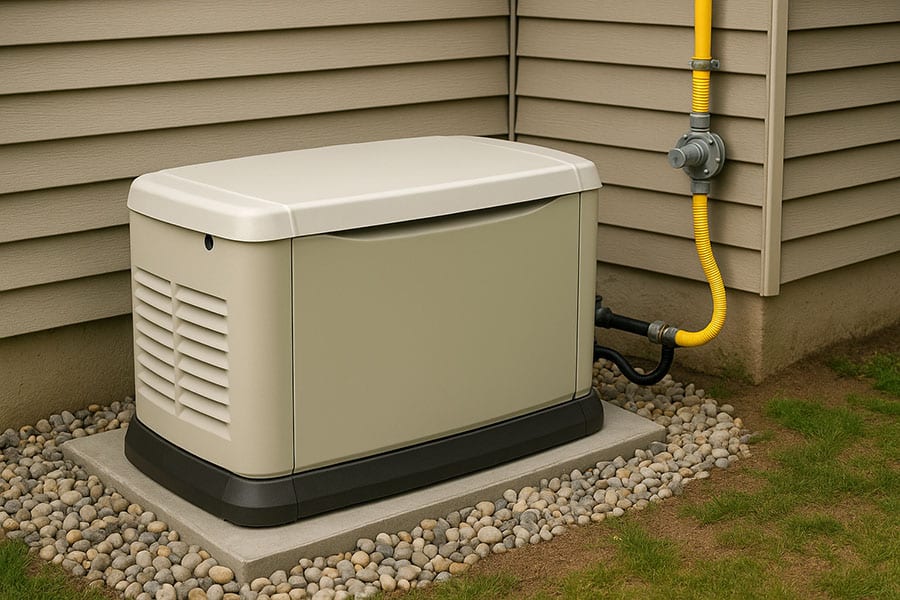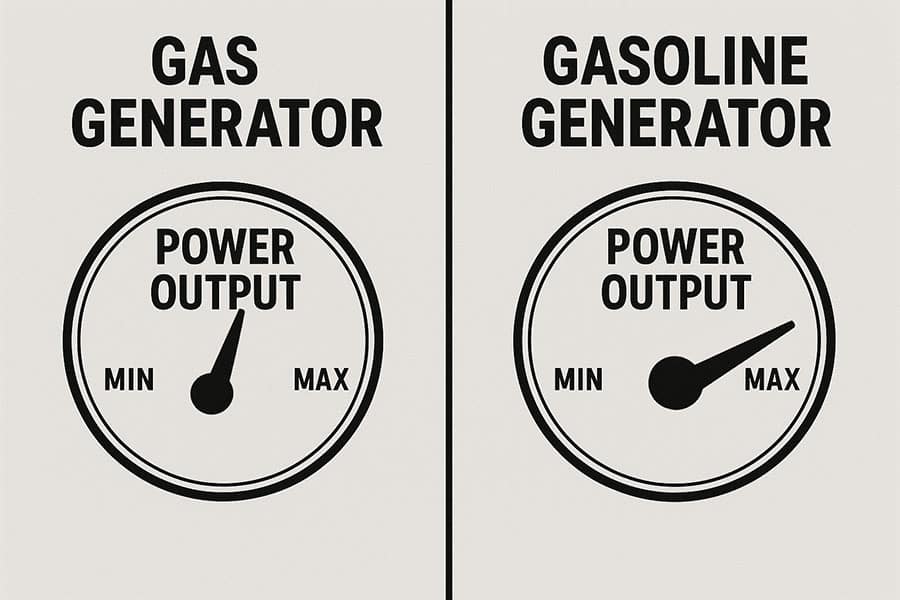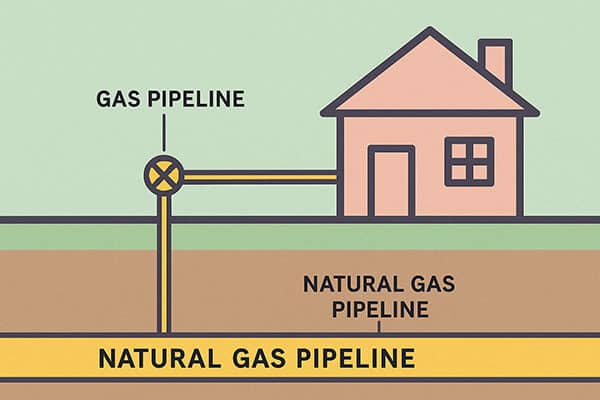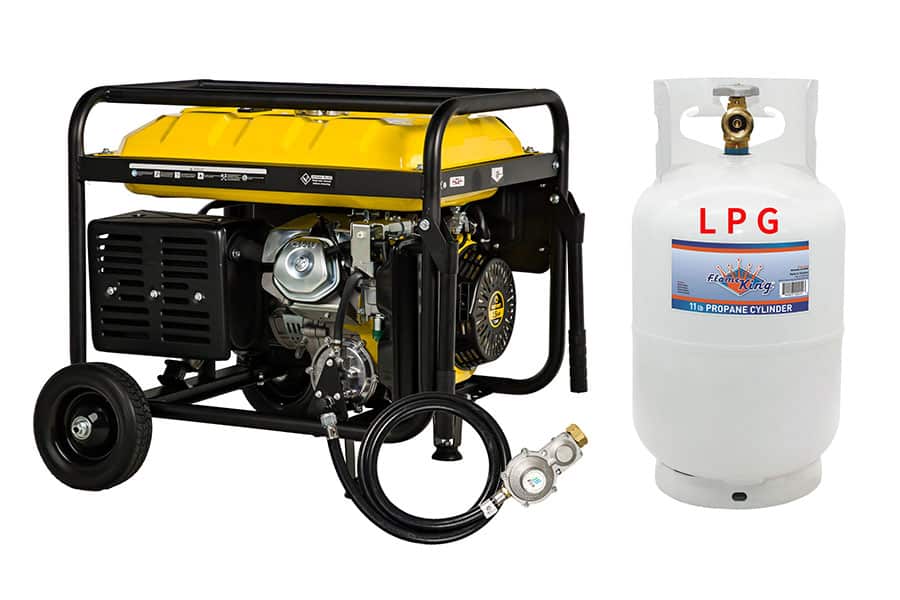Thinking about natural gas generators but fear the downsides? The wrong fuel choice can mean less power and higher costs. Let's look at the real disadvantages together.
The main disadvantages are lower power output compared to gasoline models, a significantly higher initial purchase price, and reduced portability. They require connection to a fixed gas line or a bulky LPG Tank1.

Those are the top-level issues that many people talk about. But as someone who manages a product line, you know the real story is in the details that affect your bottom line and customer satisfaction. The decision isn't just about fuel type; it's about performance, cost, and logistics.
Let's break down each of these points further. I want you to see exactly how they might impact your product's positioning and your company's profits.
What is the downside of a natural gas generator?
Concerned about the power drop in natural gas generators? This performance gap can hurt your brand's competitiveness and confuse customers. Let's break down why this power loss occurs.
The primary downside is reduced power output, typically 10-25% less than a gasoline engine of the same size. This is due to the lower energy density of natural gas. They are also more expensive and less portable.

The two biggest downsides that I see impact purchasing managers are the power reduction and the initial cost. They are directly linked. The science is simple. Natural gas has a lower volumetric calorific value than gasoline. This just means you get less energy from the same amount of fuel volume. The result is an engine that produces less power.
Power Output Reduction
I remember a client from the US who wanted to source a line of 5kW generators. He was focused on the "clean energy" marketing angle and insisted on a natural gas version. When my factory produced the prototype and we put it on the test bench, it struggled to produce 4.2kW. The client was shocked and initially blamed our quality. I had to walk him through the engineering reality. It’s a fundamental trade-off with the fuel itself. You can't market it as a 5kW unit if it can't deliver that power.
The Price Factor
To get that 5kW of power from a natural gas model, you need a larger, more robust engine than you would for a gasoline model. This increases the manufacturing cost significantly. The specialized fuel system for natural gas also adds to the price tag. So, you end up with a generator that is both more expensive and less powerful for its size. Here's a simple comparison for a generator with the same engine displacement:
| Feature | Gasoline Generator | Natural Gas Generator |
|---|---|---|
| Rated Power | 5,000 Watts | ~4,200 Watts |
| Unit Cost | Base Price | Base Price + 20-30% |
| Portability | High (Internal Tank) | Low (External Tank/Line) |
| Best Use Case | Job sites, mobile power | Home backup, fixed installs |
What are the disadvantages of natural gas?
The generator is one thing, but what about the fuel? Natural gas sourcing and infrastructure can cause major problems for end-users. Here are the fuel's main drawbacks.
Natural gas requires a dedicated pipeline for a continuous supply, which limits portability and isn't available everywhere. If using LPG tanks, they are heavy, bulky, and need regular refilling.

When you decide to offer a natural gas generator, you are also making a decision about your customer's access to fuel. This is a major logistical point that many brands overlook. Your customers will fall into one of two camps, and each has its own serious limitations that affect the product's usability.
The Portability Problem
For true natural gas, the generator must be permanently installed and connected to a utility gas line. This makes the product a stationary home backup unit, not a portable generator. You completely lose the market for construction sites, RV users, and outdoor events. I once had a client who ordered a batch of portable generators that could run on LPG (liquefied petroleum gas), thinking he could capture the portable market. The feedback was terrible. Construction crews hated dealing with the heavy, awkward LPG tanks. They found it much easier to just pour gasoline from a can.
Fuel Availability and Storage
If your generator is fixed to a natural gas line, it's very convenient, but only if that service is available and reliable in the customer's area. In many rural or developing regions, it's not an option. For the LPG models, the customer has to manage the storage and replacement of heavy steel tanks. Unlike a gasoline can, you can't just top it off. You have to take the empty tank to a certified exchange or refill station. This is a huge inconvenience that customers often don't consider until after the purchase.
| Fuel Type | How to Refuel | Portability | Key Challenge |
|---|---|---|---|
| Gasoline | Pour from a can | High | Fuel can go stale |
| Natural Gas (Pipeline) | Always connected | None (Fixed) | Requires professional installation |
| Natural Gas (LPG Tank) | Swap heavy tanks | Medium | Logistics of swapping tanks |
What are the advantages of natural gas generators?
We've only discussed the negatives. But ignoring the positives could mean missing a key market opportunity. So let's look at the advantages of natural gas generators.
Key advantages include lower running costs due to cheaper fuel, cleaner emissions2 for better engine longevity, and a continuous fuel supply when connected to a pipeline, eliminating refueling during outages.

Despite the clear disadvantages in power and cost, there are very good reasons why natural gas generators exist and sell well in certain markets. As a product manager, understanding these advantages allows you to position the product correctly and target the right customer. If your customer's priority list matches these benefits, then a natural gas generator is an excellent choice.
Lower Operating Costs
This is the biggest advantage. While the initial purchase price is higher, the cost of natural gas per kWh of electricity produced is often much lower than gasoline. For a customer who uses their generator frequently, like for prime power or in an area with constant power cuts, the fuel savings can pay back the higher initial investment over time. This is a powerful selling point you can use in your marketing.
Cleaner and More Reliable
Natural gas is a very clean-burning fuel. This means fewer carbon deposits inside the engine, leading to longer engine life and less maintenance. For fixed home backup systems, this is a huge plus. Homeowners want a "set it and forget it" solution. I have a client who successfully sells premium-priced NG units by focusing on this reliability. When connected to a utility line, the fuel supply is almost endless. During a week-long outage after a storm, your customer won't be driving around looking for an open gas station; their generator will just keep running.
Here is a summary of the trade-offs:
| Aspect | Pro (Advantage) | Con (Disadvantage) |
|---|---|---|
| Cost | Lower long-term running cost | Higher initial purchase price |
| Power | N/A | Lower power output for its size |
| Fueling | Continuous supply from pipeline | Requires pipeline or heavy LPG tanks |
| Emissions | Cleaner, less odor | N/A |
| Maintenance | Less engine wear, longer life | N/A |
Conclusion
Natural gas generators offer cleaner, cheaper fuel but at the cost of lower power, higher initial price, and less portability. Evaluate these trade-offs for your specific market.

